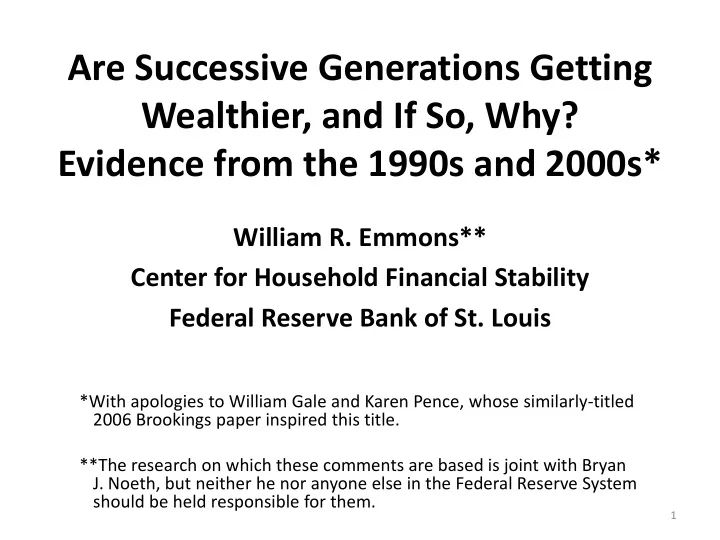

Are Successive Generations Getting Wealthier, and If So, Why? Evidence from the 1990s and 2000s* William R. Emmons** Center for Household Financial Stability Federal Reserve Bank of St. Louis *With apologies to William Gale and Karen Pence, whose similarly-titled 2006 Brookings paper inspired this title. **The research on which these comments are based is joint with Bryan J. Noeth, but neither he nor anyone else in the Federal Reserve System should be held responsible for them. 1
Are Successive Generations Getting Wealthier, and If So, Why? Evidence from the 1990s William Gale and Karen Pence ( Brookings Papers on Economic Activity, 2006) YES, based on econometric evidence using the Fed’s household- level tri-ennial Survey of Consumer Finances, 1989-2001 G&P overall conclusion: Changing demographics explain virtually all of older families’ large wealth gains over the 1990s Successive generations are wealthier because they’re better educated, healthier, less likely to be widowed, more women worked, worked more years, etc. The booming 1990s stock market and increased 401(k) participation DO NOT explain much Older families captured most of the overall wealth gains 2
Are Successive Generations Getting Wealthier, and If So, Why? Evidence from the 1990s and 2000s William Emmons and Bryan Noeth (working paper) Survey of Consumer Finances, 1989-2010 (and checked 1989-2001) All of the main Gale-Pence findings still true Demographics dominate when explaining wealth accumulation Older families captured most of the wealth gains, 1989-2010 Our contribution: New findings that birth year matters a lot Holding all else constant, we find rising wealth only for birth-year cohorts through the late 1940s Ceteris paribus , we find declining wealth for Baby-Boom and Gen-X cohorts through about 1980 Too soon to tell for cohorts born after 1980 Implication: Today’s seniors (pre-Boomers born before 1950) likely to be richer than those to come, holding all else constant 3
Each Successive Generation Born Before 1950 Became Wealthier 4
After 1950, Family Wealth Declined, Holding All Else Constant (i.e., Demographics, Year Effects) 5
Same Basic Results Using Gale and Pence’s Data— SCF During 1989-2001 Only 6
In Sum: Generations Born After WW II Did Not Become Richer Than the Ones They Followed Each successive generation during the first half of the 20 th century was wealthier than the one before Significant improvements in educational attainment, health, institutional support for wealth accumulation Strong economic growth in post-WW II America Diminishing—but not disappearing—legacies of discrimination against minorities and women Generations born during the second half of the 20 th century seem to be losing financial ground, holding constant the determinants of wealth accumulation—Why? Depression- and WW II-era birth-year cohorts were small (15-20% below pre-Depression trend), making them “scarce” in labor market Baby Boomers and Gen-Xers were large chorts, creating crowding Cohorts born after 1980 may face more favorable labor and housing markets, but it’s too soon to tell 7
Recommend
More recommend